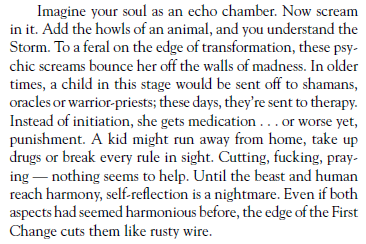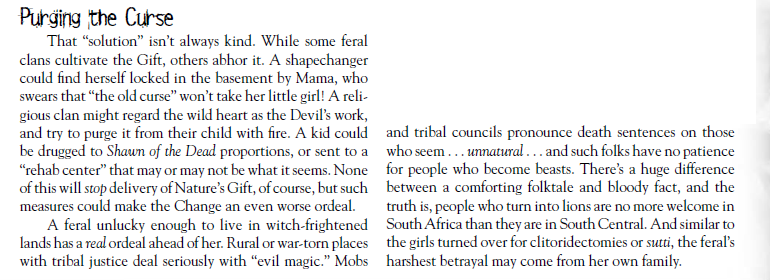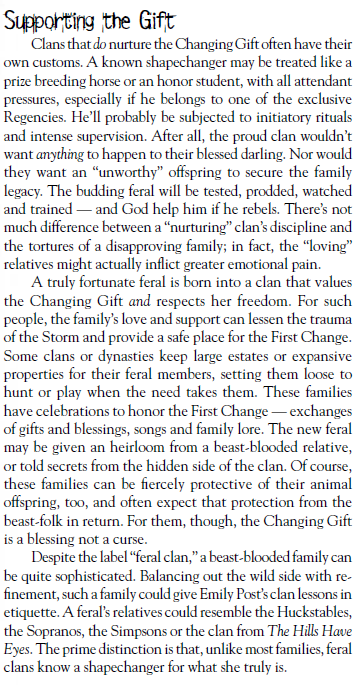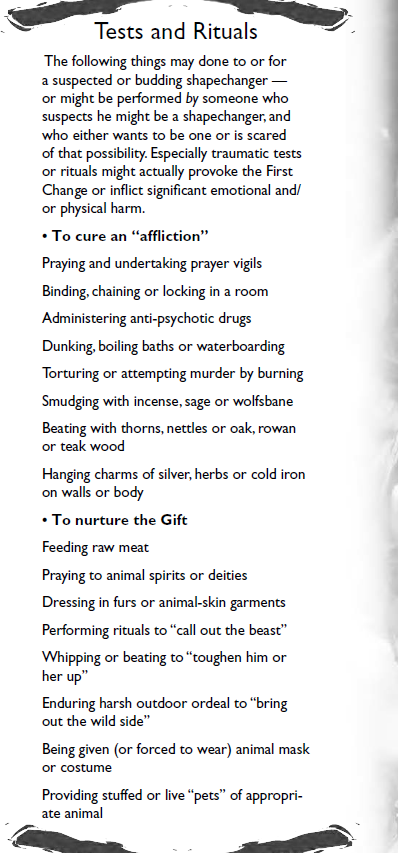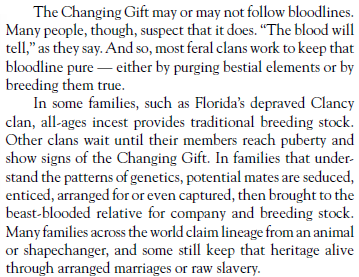Powerchords by Daeren
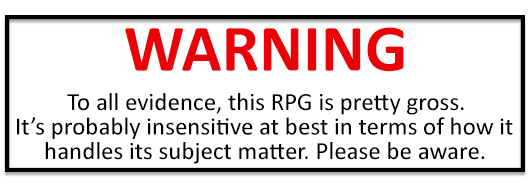
kind of a son of a bitch to work with
Original SA postYou ever like a song you never really listened to that closely? You might have loved it, or just filed it away as one of a million songs you'll remember if it comes on the radio but you'd never be able to hum a bar. Then you listen closer one day or you read some article and you realize it's really about a dude trying to pressure a woman into sex, or shooting the hipsters dancing to how the song sounds, or it's Every Breath You Take, and you just feel kinda gross as the realization hits you.
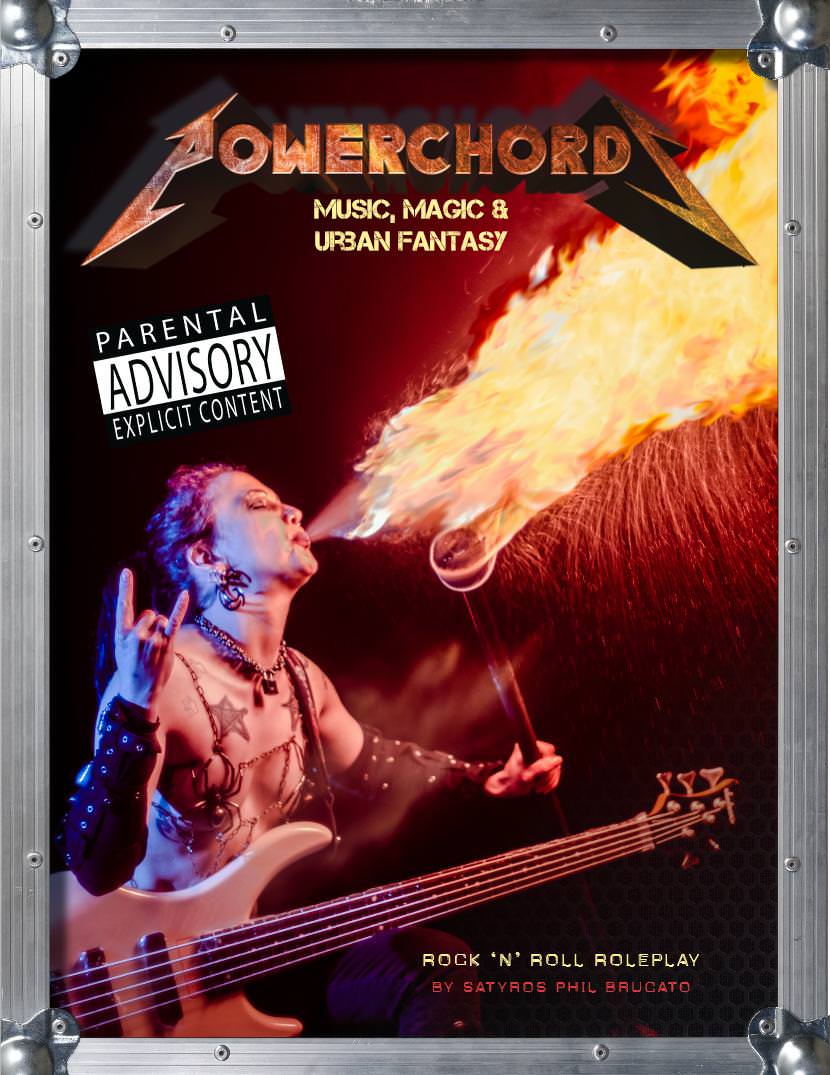
Reading Powerchords changed my view of Satyros Phil Brucato's writing in a similar way.
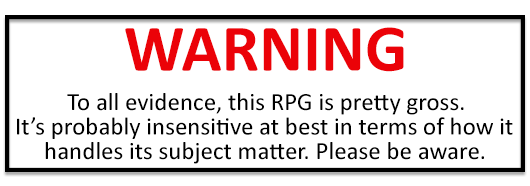

Welcome back my friends, to the show that never ends. Seven years ago, I wrote one of the very first reviews in these threads, just after the FATAL review that gave it its name. It was a review of a particularly notorious book, Changing Breeds. A whole lot of shit has happened since 2010-2011, to put it mildly. These threads have absolutely detonated in the years since, thanks to inklesspen's curation of the archive and the tireless work of many a goon. I graduated college, went through a master's program, bounced between a few jobs, and stumbled unexpectedly into a relationship with a wonderful partner. The world at large has had a whole lot of changes too, a lot of it good, a lot of it bad, and a lot of it terrifying enough to inspire several returns to therapy. Traditional games in general has had a wild ride too - Remember that in 2010, the Essentials line was just coming out for 4e, Pathfinder was the new kid on the block, Kickstarter was still pretty much the Wild West, Patreon didn't exist, CCCP still owned White Wolf, Onyx Path wouldn't even exist for two years, and the OSR was only just beginning to be associated with the name. In the time since then, a whole shit-ton of games that made huge splashes came out.
Makes the fact that a project initially pitched as a 50,000 word manuscript took seven years to come out stand out in even harsher light, doesn't it?
Despite it coming out a few months ago (at time of writing), I hadn't even heard of Powerchords until just recently. This makes complete sense, given that it was a modest project with a final funding of just above five thousand dollars, and exactly 100 backers. That's the scope of passion projects that quietly come and go on Kickstarter, a mouse in the shadow of the lions. If they quietly gutter out, only their tiny circles of backers will care, or even notice. Really, the only things distinguishing Powerchords from any other hobbyist project that quietly dies or gets Chinese Democracy'd are the following:
1) It had an in-depth post-mortem of what went wrong written by its developer that was considerably more sincere about screwups than most mismanaged projects';
2) It was written by one of the bigger and more eccentric fish in our particularly small pond.
For those who don't know him, Phil Brucato - who has recently changed his legal name to Satyros - was the main developer of Mage: the Ascension, and a contributing writer or book dev to many, many things in 90s World of Darkness material. He is, for better or for worse, the soul of Ascension - the reason the game is what it is. You can argue how much of its strengths and its faults are rooted in his writing, or from the people editing his writing, but it would not be the gloriously messy neopagan technophobic-no-wait-technofetishist-no-wait clusterfuck it is without him.
The problem is that he was, by all accounts I've ever heard, kind of a son of a bitch to work with.
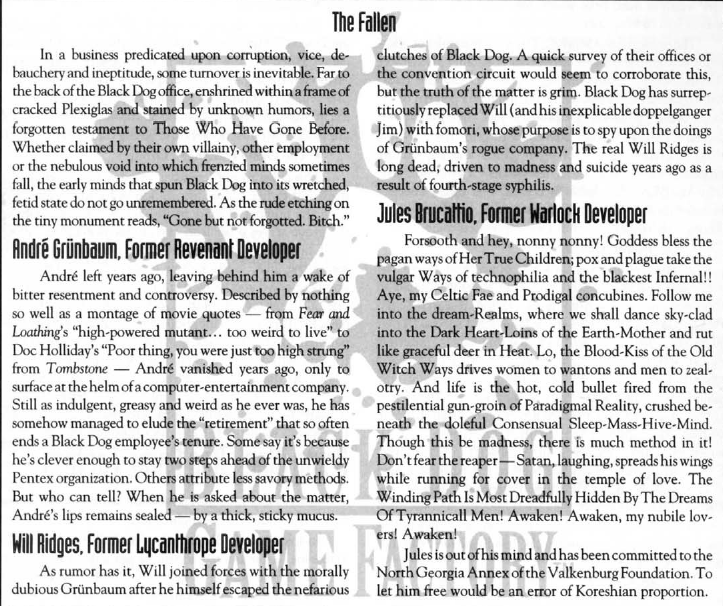
After all, when your co-workers are putting NPCs like this in their books after you've left the building, it's not hard to draw a few conclusions.
As you may imagine from that writeup, Brucato is largely known for being a very vocal neopagan that has neoprimitivist leanings and a complete inability to hide the fact that he's horny on main at all times. He's contributed to four different books about sex and neopaganism, one of which I managed to actually track down and read. The best analogy I can give is that reading enough Brucato-directed material gives you the impression that it's written in the voice of the uncle that half-cured his brain in the 70s with ten different drug habits, and you only ever see him at Thanksgiving despite your family never really inviting him anymore, and everybody's keeping half an eye on him to make sure he doesnt get too deep into the wine and start talking to the nieces and nephews about things he really shouldn't.
He changed his legal name to Satyros for pity's sake. That's about as subtle as that Squidbillies hat that says "BREATHE IF YOU'RE HORNY."
After 2000, he had very little to do with White Wolf until the last thing he did before being brought back to the company for Ascension's 20th anniversary books:Changing Breeds. I have plenty to say about that, him, and his role in my review of it.
So, with that established, we come to a very important point: Brucato had editors and company oversight when working with White Wolf. They may have had some really painful edgelord phases (cough, Montreal by Night, cough), but there was someone to answer to that could say "yo, hang on, no we can't print that." He's done a few personal projects since then, but Powerchords was my first exposure to him writing with nobody to answer to but himself.
 This book gets fucking creepy.
This book gets fucking creepy.
This intro post is largely to establish this, and discuss how I'll structure the review. This book is 95% what you'd expect from Brucato writing about musical magick-with-the-k, but the last 5%, scattered thinly across the book in passing mentions or short bits of narrative fiction, show a remarkably unsettling pattern. I rolled my eyes at the explicit content sticker on the front of the book as a hackneyed little bit of music history ephemera, but if anything it's selling the warning short.
 This book contains repeated mention or barely-subtext insinuation of children and teenagers having sex with adults. One of these instances is incestuous. Many of them are in discussions of groupies. NONE OF THEM ARE MORE THAN PASSIVELY NEGATIVE OR JUDGMENTAL TO ANYONE BUT THE UNDERAGED PARTY IN THE ENCOUNTER. There is, however no explicit description of sexual activities, merely statements that they occur.
This book contains repeated mention or barely-subtext insinuation of children and teenagers having sex with adults. One of these instances is incestuous. Many of them are in discussions of groupies. NONE OF THEM ARE MORE THAN PASSIVELY NEGATIVE OR JUDGMENTAL TO ANYONE BUT THE UNDERAGED PARTY IN THE ENCOUNTER. There is, however no explicit description of sexual activities, merely statements that they occur.
While on its own this would be enough to leave an exceptionally sour taste in the mouth, the particular phrasing and structure of several of these mentions set off red flags in every abuse survivor I showed them to. It also makes the book's discussions of any and all related or roughly approximate topics (sex, maturity, age) considerably sketchier.
Excerpts or tangents I post that I deem sufficiently dire enough to require a reiterated content warning will be posted with one, and the text and my discussion of it will be placed in spoiler tags below it. I will also edit any posts requested to have spoiler tags and content warnings if I miss that mark.
The maddening thing is that there's some value to this book, even if it's deeply opinionated about music and music history. There are a few pretty clever ideas in it, and I genuinely like the idea of marketing it as a system-agnostic setting book that comes with optional standalone rules, even if it's pretty nakedly just so it can be stapled on top of oWoD and Shadowrun (really, he calls them both out.) It just happens to seem to be entirely too okay with the idea of fucking children for me to leave that out of the first post in good faith.
It's the sort of thing where a good editor could have saved it from itself (if their cuts went through). Unfortunately, the editor of the book was Brucato's current romantic partner, who also served several other roles in the production of the game, thus proving why third party editors are a good idea.
Well with that elephant air dropped into the room, that's largely what I wanted to say for now. My actual review will begin with a discussion of the postmortem of the game Brucato wrote for his Kickstarter backers, then I'll go through the game itself. One thing I'd like to say up front as well is that I'm, bluntly, pretty uninformed about a lot of music genres and history. I was raised by a very Dad Rock kind of family and never really went too far from that. This book, though, namedrops, references, and passes judgment on bands and styles constantly, so I will be posting a lot of direct mentions of stuff so those who know what they're talking about can evaluate his statements and extrapolations, because even I had a few "wait a fucking second" moments reading the book.
Before you ask, no, he's astoundingly not a "Everything But Rap And Country" guy.
Next time: Brucato Didn't Run A Very Good Kickstarter
Behind the Music
Original SA post
quote:
Well, it took seven years to bring the book to fruition, but Powerchords: Music, Magic & Urban Fantasy is finally done.
Why did it take seven years?
A reasonable question. Here’s the answer: Lots of shit went unpredictably wrong, but the result was a far better book than what would have been produced had things gone as they were originally planned to go.
Welcome back. Consider today our Behind the Music episode.
As mentioned last time, Brucato wrote a three part dissection of what went wrong with Powerchords when it finally came out, and I actually read it before I ever opened the book up. It was a particularly enlightening read in a few different ways, as I'm sure you'll see for yourselves. You're free to read the actual posts yourselves; I'll be going over the highlights here. In addition, I'll be picking some observations out of his updates to the project over the years, and the comments on them.
Right off the bat we get the correct realization of the big problem:
quote:
The biggest mistake on my end involved pitching a project I had not yet written. Because Aaron Acevedo (who proposed that we do “a quick little project” together, using the brand-new-at-that-time Kickstarter platform) and I were new to crowdfunding, neither of us realized that such projects should never be launched until at least the initial work is already completed.
I'm actually pretty forgiving to him learning this lesson the hard way. A lot of much bigger names had to as well - Onyx Path's biggest albatross for three years was Exalted 3e, after all, and he did his Kickstarter three years before that one. It's one of those things that, especially in the early years of Kickstarter, was an invisible landmine.
Now, you might say that he was an experienced writer that should have known the scope of his project and pitched its budget and development time correctly. To which the answer is, he did! It was entirely reasonable to publish a 50,000 word book in the time and price he set.
Except he made one of the other classic early Kickstarter death sentence blunders: Death By Backer Bonuses.
quote:
Half-expecting maybe a dozen backers at the higher tiers, I promised bands and characters to sponsors at certain levels of the project. Instead, I got over two dozen sponsors at those levels, and needed to deliver on what I had promised to provide. That promise alone accounted for almost 30,000 words of material in the final book… and it would have been even longer than that if everyone who backed the project at that level had given me bands and characters to put into the book.
(Backers who didn’t get bands and /or characters in the main book will have their creations appear in subsequent books. Just let me know what you want, and I will write it in.)
He's hardly the only person to dramatically underestimate the popularity of backer content additions. Many a video game developer has ended up with a millstone the size of Russia around their neck because of that. As for people not getting back to him...dude, it was a seven year dev process. A few of them may very well be dead.
At least so far the mistakes are largely naive Kickstarter mistakes right?
quote:
Beyond that predicament, though, I realized once I began writing the book that:
A) there was no way I could cover what I had planned to cover with only 50,000 words or so unless I did a half-assed job of doing so; and…
B) I was having way too much fun writing the book to stop at only 50,000 words or so.
https://www.youtube.com/watch?v=WCVV0xbL3_0
quote:
Speaking as someone who has loved music his entire life, and whose personal involvement in musical culture reaches at least as far back as my temp-roadie gig for the Four Tops during a weekend festival in 1982, Powerchords is the passion-project I didn’t realize I wanted to do until after I’d started writing it. Inspiration poured out of me once the writing began, and the more research I conducted – research that has included reading several hundred books on the subject with no end in sight – the more I wanted to write. That writing began in October, 2010; by the following spring, I had well over 50,000 words of material and had only just begun to scratch the itch that arrived once Powerchords took shape. Also, none of those words included any of the characters or bands I had promised to my backers.
Oops.
At least he sent out a poll to his backers asking if they wanted more before he committed fully to scope bloat, but...consumers will always say they want more for what they paid.
Y'see, Brucato has been noted before to have serious verbosity issues. (And let me tell you in advance, Powerchords is no different). He's also the sort that very much does not like to make cuts of anything he's written - he'll freely admit how hard it is for him. Mage: the Ascension's 20th anniversary edition was largely penned by him, and he takes pride in its wordcount pre-editing being 650,000 words. I'm pretty sure he's the only one involved with that project who does, considering that the final form of the book was still big enough to crush small animals on the way down from a coffee table and must have had a printing cost measured in arms and legs.
Oh, yeah, speaking of which.
quote:
Part of the rewards promised to Powerchords supporters included a full-color copy of the finished book – a rewards-tier I had foolishly budgeted at the $50.00 level and above. Thanks to an unexpected level of support, I wound up needing to deliver over 60 copies of that book. Given the growing word-count, and the rising cost of printing, I realized that I was liable to be spending more to print and deliver the book than I had netted from the campaign to begin with.
Around 2012, Sandi and I realized that I had over 200,000 words of material, with more of it on the way. At then-current prices, the promised full-color hardback edition of the book would cost around $40 per unit just to print, and even more to ship out to our sponsors. (That’s not even counting the cost of the T-shirts certain sponsors will receive – a reward that added several hundred more dollars to the cost of fulfillment.) After a lot of late-night soul-searching, I began cutting the book down to a more affordable size, revising the text as I went along so that it didn’t have gaping holes where the cut work had been.
Oops indeed. Weird how basically the exact same thing happened to Mage a few years later, minus the t-shirts...but we'll get to that. (You ever wonder why Kickstarters don't do t-shirt reward levels anymore? They will sink you every time.)
To skip over a whole lot of words, his other big mistake was not correctly budgeting for failed backer payments and the fact that you have to pay taxes on income via Kickstarter, leaving him a thousand dollars in the hole of his budget. The budget he made for a project that eventually increased in scope by 350%. After dividing the payments to his artists, graphic designers, "final editor" (again, we'll get to that one), and models (who he promised payment in full color print books), he found himself in a position where he needed several thousand dollars to actually finish paying people and afford the print run.
So he agreed to write M20.
And neglects to mention in this post-mortem that he proceeded to write so much for it that he nearly drove his employers into the exact same fate of project death by printing costs, if it wasnt for editors with chainsaws.
Yeah, this is about where the sympathy wears off, despite him attempting to garner it via his collaborators. In short, a bunch of horrible shit happens to his editors and graphic designers he declines to elaborate on out of respect for them, which drags out the project for another year because he "would have been an ogre to demand that they finish the project while those things were going on" - and also didn't have any money to replace them. It's here, though, that it's clear that some of the delay was not the fault of Shit Happens:
quote:
After almost three years of delays, Sherry stepped back in to finish the project. For that near-final stretch, we fit our work-parties in whenever our busy schedules gave us time to do so. Once again, this process ran slowly, in part because Sherry and I hand-designed every single page of Powerchords – a notable departure from the usual practice in RPG graphic design. Generally, a gaming book is laid out within a specific template; text and illustrations get dropped into pre-set configurations, and the majority of the work involves tweaking the final layout to catch errors and suit the text and images as closely as possible. Sherry, Sheena and I, in contrast, created Powerchords’ look and feel from the ground up. There was no template to follow because we made it up as we went along, and then tweaked it until it suited what we wanted to see.
You see this?
DON'T FUCKING DO THIS.
First of all, there's a time and place for artisanal bespoke handcrafted .pdfs, and it's not when you're four years late on a project and several thousand dollars in the hole. Second of all, this is laughably reductive of template work, and implies it's innately inferior to just winging it when trying to do that in any professional graphic design or layout job would get you killed. Lastly, templates are there not just to provide consistency and speed things up, they're there to save your ass when you screw up. Not if, when. I would bet money there was at least one moment of frustration and delay in the process of creating Powerchords that could have been completely avoided with a template - and the fact that he didnt have the file crash or corrupt and completely explode at least once leaving him back at square one is more of a miracle than I think he realizes.
This is in fact a good time for a little tangent out of the post-mortem into the updates.
quote:
The least-fun, least-sexy, least-creative and yet absolutely essential stage of a large book like Powerchords involves making an index for that book. And although there are programs that can hash together a quick index of dubious accuracy and limited utility, I create the indexes for my books by hand... a tedious, time-and-labor-intensive task, but one that gives me the index I want, not the index I can kinda sorta live with.
Initially, I didn't plan to make an index for Powerchords. On my second read-through during the layout-proofing stage, though, I realized it really needed one. You cannot create an index until the layout for the book is locked down and all corrections have been made (well, you can, but then you get a shitty index (*cough* Wraith 1st Edition *cough*), so I had to hold off on this step until Sherry and I had finalized the layout. Once that was done, I began the long process of...
-Going through a draft-quality printout of the entire book with a highlighter, spotting terms that should be indexed and noting where they appear. For Powerchords, I did this stage three times, in order to make sure I caught all the things I wanted to note.
- Determining which terms, and references to those terms, should appear in the index, as well as noting the places where the page citation is most important (say, the pages where a given thing is specifically described in detail), as opposed to places where it's simply mentioned in passing.
- Taking out a few legal-sized notepads and going through the highlighted printout, word-by-word, page-by-page. As I find highlighted terms, I scrawl them out on the legal pad, and then add page numbers as I find them in the printout. Although I used the lexicon of Mage 20 as the foundation for its index (an index that, in that case, took me almost three weeks of long work-days to complete), the one for Powerchords was made up as I went along because there was no master-list of vital terms to begin with.
- After I'd gone going a bit more than halfway through the printout, my notepads became too messy and disorganized to work with. [...] I spent two days transcribing the terms and references from the pads into a collection of indexes in a Word document. Those entries feature bolded text to note page-numbers where an entry is especially important. This bolding makes it easier to reference the index quickly, without poring through each notation until you find the most important one(s).
- Once those entries are transcribed, I let the computer sort them into alphabetical order for me...
- ...and then printed them out so that I can note the page references for the second half of the book on a list that's in alphabetical order, is far easier to read, and already features most (though not all) of the terms that will find their way into the index...
- ...and then add them to the Word file, consolidate several sub-indexes (which facilitate faster work for me) into the final index file, which will then be laid out and added to the book.
- The printouts are then gone over again for corrections and adjustments, which are then typed into a final index Word file.
If any of you happen to hear wet, agonized, strangled screams, that'd be most of the professional copywriters and editors on this forum having a stroke at the same time. Poor bastards probably just got over Exalted 3e's layout fiasco too. For those unacquainted with the sane human being version of editing and indexing, this is solidly in "I award you no points, and may God have mercy on your soul" territory.
So, it should be abundantly clear by now that it was not merely external factors that slowed the process down, that Brucato is ultimately the root of this project being a lumbering overscoped behemoth, and is almost willing to fully admit that while only halfway understanding how. We're not done with the post-mortem yet, though, so maybe it'll have some more self-reflection...
quote:
I understand the frustration our sponsors have felt regarding the book’s many delays. Trust me, no one has been more frustrated about than I have been. Some folks, though, have accused me of “stealing from my fans,” as if the dozens of PDFs and illustrations and updates I have posted over the last six years were somehow magically conjured up without cost or effort by the people involved.
And that sentiment insults my collaborators.
ooor we get him using his collaborators as human shields against criticism.
quote:
Folks want to be annoyed with me for taking so bloody long and being such a fucking perfectionist? That’s fair. I accept that. But to imply that the hundreds – hundreds – of hours of skilled labor that Sandi, Sherry, Bryan, Sheena, James, Ace, Valerie, Eli and our models put into those excerpts, those updates, those illustrations and samples of the book, somehow constitute “theft”? That’s insulting as fuck.
Powerchords is the result of intense labor from over a dozen people. Every one of the hundreds of illustrations in this book was produced either by hand-drawing and then computer-coloring the images, or by photographing them and then spending hours processing and adjusting each image until it met the high standards of the photographer involved. Quite a few of those photos were staged – that is, lit and arranged while models ran through poses and the photographers shot the results – and it’s often difficult to tell which photos came from actual performances and which ones were staged in a studio, a living room, a garage, or (in the case of the front cover) Inky’s back yard. We all spent hours setting up and tearing down those sessions, after which Sandi and I spent weeks with Lightroom and Photoshop… at which point Sherry and Sheena spent more weeks arranging those images and the rather dense text into something that looks like no other RPG book on the market.
We shared this process with our backers along the way, posting excerpts as the project progressed. And yet, someone wants to consider all those hours and all that labor “theft”? Fuck that. Yes, it took a long time, and yes the delays were frustrating as hell for everyone involved. To deny the amount of work involved and shown, however, and to consider it “stealing,” is to deny the efforts of our crew. It insults their work, and it insults my friends. Call me a liar? Fine, whatever. But do not ever demean my people and the work they do.
Also, my collaborators, as mentioned earlier, were paid. Out of my pocket. With money far exceeding what we netted from this campaign.
A handful of images came from stock companies when we could not produce specific illustrations ourselves; even then, however, the use-licenses were paid for, someone had to take the photo to begin with, and Sherry still modified those photos to fit the graphic design of the book as a whole. If this had somehow been some scheme to “steal from my fans,” then I’d done a really shitty job of it because I wound up thousands of dollars in the hole even before the book and T-shirts go to press.
When the process stalled out due to lack of funds, my friend Vincent Joseph Kinzer offered us an unexpected loan. With it, I hired Valerie Herron to create the T-shirt design.
And that’s around the time Sherry’s computer died.
I have taken to calling it “the Curse of Hendrix”: an absurd, almost-comical series of unpredictable events that threw Powerchords further and further off our intended schedules. It began less than a month after the campaign funded, when some asshole hacked the email associated with my Kickstarter account and locked me out of it for several months, and continued through the series of personal and professional storms referred to in Part Two. It struck again last Monday, right after we finished the final work-party and I’d sent the PDF off to our sponsors: Sherry’s near-new hard drive crashed while backing up the book, taking that day’s labor with it. Thankfully, we’d finished the PDF and removed it from that computer, so she’s able to reconstruct our last day’s work from the backup. My point here is that this was stuff that should not have happened but which happened anyway. In spring 2017, when Sherry’s computer died the first time, we both threw up our hands and said, “We’ll finish it when we can finish it.” Because we had a final layout by that time, I began working on the index (see my previous updates on that subject) so that we’d be ready to go when my freelance check finally came in.
The unpredictable nature of that Curse kept me from posting further updates on the Kickstarter page. After all, what was I gonna say? “Sorry, something else came up, again?” Until I had the paycheck in my account, I had no way of assuring people when the project would be completed – and after six years and counting, my assurances that it would ever be completed were beginning to sound hollow, even to me.
So by the by, nobody I saw in any of the comments on his updates or kickstarter called him a thief directly, though I may have missed one. It was primarily one guy in particular every so often getting more and more irate about seven years going by, with repeated stretches of months without any update. This level of detonation, though? This attempt to paint it as a noble effort struck down by unexpected chaos, after fully admitting in the first part it was primarily his fault for mismanaging the shit out of the Kickstarter, reads a lot more like trying to cover his ass and repair a bruised ego than an explanation. It's also so wildly unprofessional to be hostile to your backers - your 100 backers of a 5,000 dollar project - after they've stuck through a seven year development process, and writing off leaving them out of the loop by dropping updates as "oh fuck it its pointless" that it's actually a little awe inspiring.
I highlighted that bit of possessive language because it sits...uncomfortably with me, for reasons I think you'll understand by the end of the review. Though, it's a good segue into one of the other things: that his language towards his collaborators in the update posts was often considerably less charitable.
quote:
Update 120: In Layout...Still.
*sigh* Powerchords is STILL in layout. Sherry wound up stuck with two jobs and no time, and so the project has been in her hands for almost four months with no real progress.
Thankfully, she finally got a new job and is back on the job. So it's moving forward again.
Sorry about yet another damned delay. But work IS happening, just very slowly.
Thanks.
quote:
Just commissioned some more art from Tess Fowler, to replace one of the original artists who has not come through on his end of this project. Mage 20 is almost to edit, and the Powerchords editor has asked for more time to finish up.
To be honest, I'm kinda frustrated too.
A few folks have asked whether I'm still committed to the project. And yes, I am - committed to the extent of paying out of my own pocket over twice as much as I grossed for this project in the first place.
Powerchords has taken a ridiculous amount of time to finish. I apologize for that.
But as I've mentioned in a previous comment, those delays are BECAUSE I care about the project and its backers, not because I've lost interest.
quote:
I needed to jostle one editor last week because they'd barely started reading the manuscript I'd sent out over two months ago.
quote:
Sorry about the delays. Editors are being really slow. Considering that I am eyeballs-deep in Mage: The Ascension 20th Anniversary, this isn't too bad at the moment, but I really want to hop on this thing the moment Mage is turned in. (End of July.)
quote:
Update 114: Still Waiting On Artwork...
Yeah.
Someone who will remain nameless choked up a hairball on the artwork, and has been replaced by two other people.
It's understandable to be very frustrated with a project that's going like this, and to have that bleed out a bit, but...I don't know. Something sits badly with me about shit like this.
With that, though, we've gone over the whole post-mortem and Kickstarter itself. I may have missed some details in the updates/comments/whatever, but this post is already incredibly dense with shit to take in and talk about. Brucato undeniably got hit with a lot of Unknown Unknowns, I will not deny that, and that can certainly kill a Kickstarter stone dead. I'm legitimately pretty amazed that this book came out at all after reading through everything. But, he seems to only bring up his own screwups in order to get them out of the way so he can talk about how unfair everything else was to the project. He could, at any time, have cut his losses, published what he originally promised to publish, taken the hit, and had some portion of a hundred people mad at him, depending on how good the mea culpa was. He's already promised to sell excess material he refused to just cut in further books - why not just make the initial book economical, and offload a lot more into those expansion splats that'll reach a wider audience once you've filled your obligation? Pride? Perfectionism? Sunk cost fallacy?
It certainly set one hell of a stage for me before I even opened the book, and let me just say the book itself reads exactly like the result of a project like this would.
Next time: we open the Ark of the Covenant itself.
Track I: How Do You Do, Fellow Kids?
Original SA post
Track I: How Do You Do, Fellow Kids?
So, we start with the dedications and credits, and I have to start with an admittedly petty criticism:
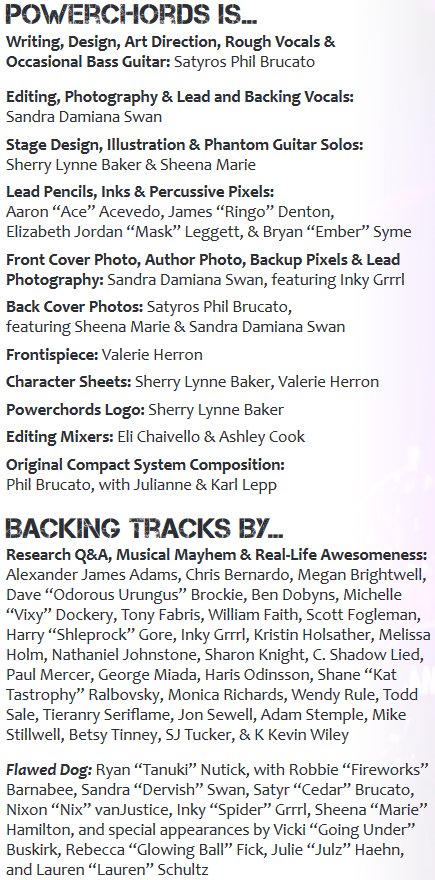
Legit, there's a time and a place for jokey credits, but it's hard to tell what here's fluff and what's a distorted actual credit. What the hell is "backup pixels"? Are editing mixers secondary editing passes? Why the hell are you using the word frontispiece instead of "Cover Art"?
Another thing; as you can see here, a bunch of this segment (especially the beta tester bit) has people with stage names that read as...well, the sorts of self-given stage names dorks who try to start rock bands in their 40s are really insistent you call them by. Again, petty, but it set a tone for me before I even hit the table of contents.
The dedications themselves are largely as you'd expect, with some legitimately heartwarming ones like thanking his mother for putting up with being his ride to concerts when he was growing up, and to someone for putting up with "my Richmond band days...especially the ones when none of us knew how to play our instruments." On the other hand...
quote:
Ashley Coyote Ward, my Beloved Feral Sweeteheart; her husband Brian Ward; their son Elijah; and all their Beloved Trybe.
"Beloved Feral Sweeteheart" is a new level of unsettling terms of endearment I've seen Brucato use.
(I wonder if their Trybe is called Qwest)
And this one just paints a very particular picture right out of the gate:
quote:
The DJs and station managers at WAVA and DC101 during the late ‘70s and early ‘80s, for daring to play everything from Bruce Springsteen to Rick James to the Ramones to Judas Priest to Prince to Frank Zappa to Patti Smith and the B-52s on the same radio stations, back when it was all fairly new and before terms like “classic rock” existed. (Plus a hearty FUCK Y’ALL to the folks who bought those stations and ruined ‘em in the mid-80s.)
Now, this may be my lack of radio history knowledge showing, but the only band name in that lineup I'd be even mildly surprised to see getting broad exposure in that time period is Judas Priest. It doesn't really take daring and bravery to play Zappa in the 70s, man. I suppose the intent here is that it took guts to play them all on the same station...but "Top Charts Bands: The Movie: The Station" is not exactly an innovative idea, either. Looking it up, it was explicitly billed as an Album Rock/Top 40 station during this time period, which...yeah, that's about as safe as I can imagine a niche to be for a pop music station at the time. I'm also tickled to note that it's now a religious talk radio station, which may handily explain why Brucato has a grudge against a local FM station's format change strong enough to dedicate space in it in a passion project 35 years later.
Seriously, this isn't a shoutout to Wolfman Jack, or Casey Kasem, or Dr. Demento, it's a shoutout to one of the infinite mirror-shards of the Platonic Top 40 Station. Y'know, the ones that exist to cover one city, are manned by DJs that could be replaced by soundboards announcing the next block, and send you 400 spam emails a month if you accidentally sign up to their newsletter. And he's got enough vitriol over it changing format to, textually, yell "FUCK YOU" to back before the goddamned Berlin Wall fell?
That's what stood out to me. Nostalgia propped up by a petty grudge just off-stage. It wasn't quite as snappy of a summary of the entire product as I figured it was going to be, but it certainly covers a lot of ground.
Anyway. After that, we get a half-page dedication to his father (which does get a Dr. Demento nod in passing, and a few assorted comments we'll get to sooner or later), and a list of bands he's been in, including a note that there was a single attempt in old White Wolf days to make a company band via jam session, and it "sounded even worse than we expected." It was also named SküllGün, which, y'know what? I'll give them that one. That's a fuckin' good band name.
And then we get The Obligatory "Brucato's Stuck In The 90s And Has To Put A Satanic Panic Proof Sidebar In" Sidebar, Guest Starring D.A.R.E.. (Emphases his own, this time)
quote:
DUDE, SERIOUSLY!
Although rooted in the real-life music business (a sort of fantasyland wedged firmly in between the Faerie Realm and Hell), Powerchords is a work of fiction. Oh, there’s plenty of material in here that’s part of recorded history and popular lore, but all that stuff about lifethieves and rampaging hordes comes right out of my shaggy little head.
Because I trust y’all to be smart folks, I blur the lines rather consistently between the fictional Powerchords setting, your gaming table, and whatever passes for reality in the music biz. Don’t make me regret that because you couldn’t tell the difference and so you decided to find a club called No Exit or track down albums by Bordan Grant. They don’t exist except in the shared hallucination between these covers.
And speaking of hallucinations, don’t do drugs on my account. Really, DON’T. I’m not a member of the Just Say No Brigade, but as someone with a fair amount of first- and second-hand observation and experience in the realm of recreational psychoactives, I say this firmly: This shit can fuck you up.
If you decide that you have to try partying like a rock star, just remember that’s how so many rock stars wind up broke, dead, or trying to kick King Fucking Kong off their idiotic backs. Be smart, be informed, and stay the hell away from meth, coke and heroin. Knowing what we know these days, you’ve gotta be a moron to even touch that crap.
On a positive note, learn an instrument. Seriously. Even if you’re not gonna cause Miyavi to lose sleep over competition from you, pick up a musical instrument and take some time to learn how it works. I promise you it’s more productive than playing Rock Band (much as I love playing Rock Band), and it can change your life in ways you’ll never expect.
Okay – putting away the soapbox now. The book’s waiting for you...
It wasn't until not all that much later in the book when I started getting certain vibes that this sidebar started to rub me the wrong way. When I first saw it, I just laughed it off as "oh Brucato, you scamp, now tell me the one about the Nephandi," and moved on without a second thought. Rereading it though?
This was a Kickstarter project for 100 people, presumably with billing information included. I can't imagine the target demographic of this game shot much lower than, like, age 25, considering how much 70s-80s knob-slobbery is going to be involved.
Why is this written like it's addressing a 15 year old?
No, legitimately, why? Is he convinced it needs to be there in case The Youths get a hold of it via DriveThruRPG or piracy? He says he respects the intelligence of the audience reading it, but if so, why is he reiterating the ancient, hackneyed thing about how The Magic Isn't Real (Sidebar Later In Book Going OR IS IT??? To Be Determined). If it's legitimately talking to the young or impressionable, why is it cracking a joke about Reagan era social policies they're never gonna get?
Come to think of it, why is Brucato seemingly insisting that the primary reason people become addicts is that they're idiots? There's a whole fucking truckload of reasons people pick up a smack habit, and "they havent heard the Good News of Druggie Christ" isn't usually the primary one.
Gah. Let's just turn the page and-
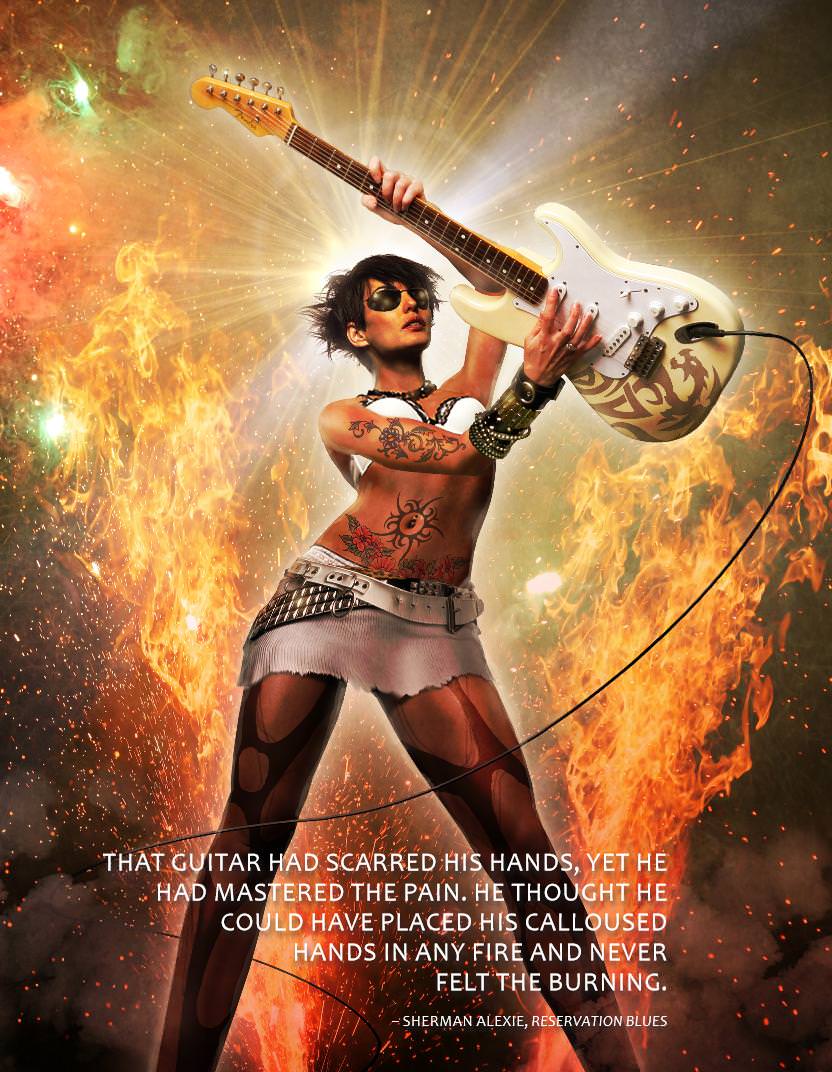
Ahh. So we're going right out of the gate with the "not getting the point" here, I see.
(In fairness, he brings up Reservation Blues a few more times through the book and shows slightly more of an understanding that it is a book about the monstrous callousness of the music industry and its tendency to industrially abuse, dismantle, strip-mine, and eject minorities that enter it...but only secondarily to its Deal with the Devil aspects being more literal.)
Anyway, the next few pages are a stretch of in-character fiction that I'm not going to do piece by piece because there'll be much better/worse targets for that later. I can sum it up as follows: "Being on stage is hard as fuck because you have to keep going if you screw up and you don't get do-overs or breaks. This guy and his band-" oh Jesus, I'm literally interrupting myself train of thought style because I forgot about this and I have to call this one out.
quote:
We all want badass nicknames, right? Especially those of us riding this rock-n-roll beastie, we want to be legends. Not the people our parents made us, but the gods we christen through our own awesomeness. We’re not Heimie Fucking Witz but Gene Fucking Simmons, Henry Goddamn Rollins, not Henry Lawrence Garfield. I’m not Gregory Phillip Oliver – I’m Ravenwolf Grigori.
Just. God. Fucking bottle this paragraph and slather it all over me, this is the good shit, this is what I signed up to review this expecting. It's so fucking wretched, I adore it, it's perfect. It'd be hilarious in a different way if it was intentionally schlock, and I'm sure Brucato would say it is, but then I go back and look at the dude giving himself like four nicknames in the Dedications section and laugh, and laugh, and laugh.
Anyway. Lurid descriptions of Concert Mojo, passing mention that it took "three years and a half-dozen bands" before people would call him Ravenwolf Grigori without laughing, more Gene Simmons dick sucking (get used to this), descriptions of the girl drummer of the band as bitchy and refusing to use the name Grigori without a sneer/using his real name to annoy him in a weird "is this a deadnaming take" sort of way, then OH NO! THINGS GO WRONG! and a fly buzzes down his throat as he's doing a death metal growl and he pukes all over the place. Then...man, I'm going to have to call this bit out too, huh?
quote:
In the back of my head, I hear [Henry] Rollins lecture me.
“Nothing can go wrong,” he says. So I swipe my hand across the back of my mouth, shake my hair out, and roar like a furious god.
That scream rolled up out of someplace primal, some inner pit of molten lava that remembered every insult, laugh or fumbled word I’d ever suffered through. Every night I’d coughed up lungs after singing my throat raw. Every hot-chick date that slid through my fingers after the wrong words jumped off my tongue and ran across the table screaming “LOSER!” Every ounce of sweat I’d baked off under bright stage lights. I roared for every person in that crowd, channeling THEIR pain, THEIR hate, THEIR defiance at a world determined to make them small.
And I got them back.
And I turned it around.
He pulls the song back together, crowd goes wild, girl drummer gives him a sarcastic toast as "The Frog Prince" instead of praising his glories after the party ("what a bitch" is the immediate followup), wrap on "I suppose even legends need a healthy sense of humor."
Okay, so, to go back a bit, you see that bit in the callout? The part where all women's rejection were simultaneously their faults for misunderstanding his fumbled advances and only a little his fault for screwing up in the first place? And how that immediately segues into not just humiliation, or a desire to do better, but pain, hate, and defiance at the whole world out to make them feel lesser? How he mantles other people and uses them as a reflection, justification, and outlet to feel better about that? How the only woman in his band is constantly belittling him and dismissing his talents alongside this?
There's a reason I took a while to write this post. It's because this book is fucking crawling with little bits and pieces like this, slivers of something vile staring up from that darkness behind the ink daring you to write it off as just your imagination. I tend to try very hard to give the benefit of the doubt to people's work not reflecting on them absent clear reasons to think otherwise, but this time, with a project so nakedly personal and meaningful to the author, and the author having next to nothing in the way of editors removing questionable content, I can only have my alarm ring so many times before I stop hitting the all clear.
Especially because the start of the next update is going to have the most
 bit of in-character fiction in the entire goddamn book.
bit of in-character fiction in the entire goddamn book.To wrap up, we have a short little pitch-summary of the game itself. I've kind of gone over everything you need to know already, and most of the rest is easily intuited/guessed (Creation is magical, everything is the reverberation of the first Big Bang/chant/note/whatever), but here we get the first statement of what the game is about, what you do.
quote:
Save Me (From Myself)
No matter what sort of character you play, that character faces a simple yet implacable challenge: Save the music from itself.
Save the music? What’s there to save? Music is everywhere, as close as your laptop or the nearest set of speakers. Anyone can make music these days. Stardom’s as close as a TV show or video game.
And that’s the problem. Because when something magical becomes commonplace, its magic goes away.
Mystery becomes trivia, and glamour’s just another game. “Keeping it real” becomes a pose based more on appearances than talent. Rebellion’s a commodity for the Establishment to sell.
What, then, can an artist do to make music miraculous again? Has music’s Age of Heroes passed away, and is everyone in its shadow doomed to keep riffing on someone else’s tune? Or can you find the key – musical or otherwise – that opens the door to a fresh, exciting age? Will you become a sonic shaman or a disposable hero? In Powerchords, music matters. The trick, then, is to find out how to bring its power back.
I feel like this speaks for itself. Frankly I'm more interested in seeing the inevitable wave of expected reactions from posting this.
Yes, I added the link, before you ask. He doesn't have that much self-awareness.
Next time: yo for fuckin real though about that content warning, keep it in mind
Track II: We Didn't Start The Fire
Original SA post
Track II: We Didn't Start The Fire
quote:
It was the road to stardom, almost like playing Monopoly. You gotta start at Go, not in the middle of the game.
PAUL STANLEY, KISS: BEHIND THE MASK
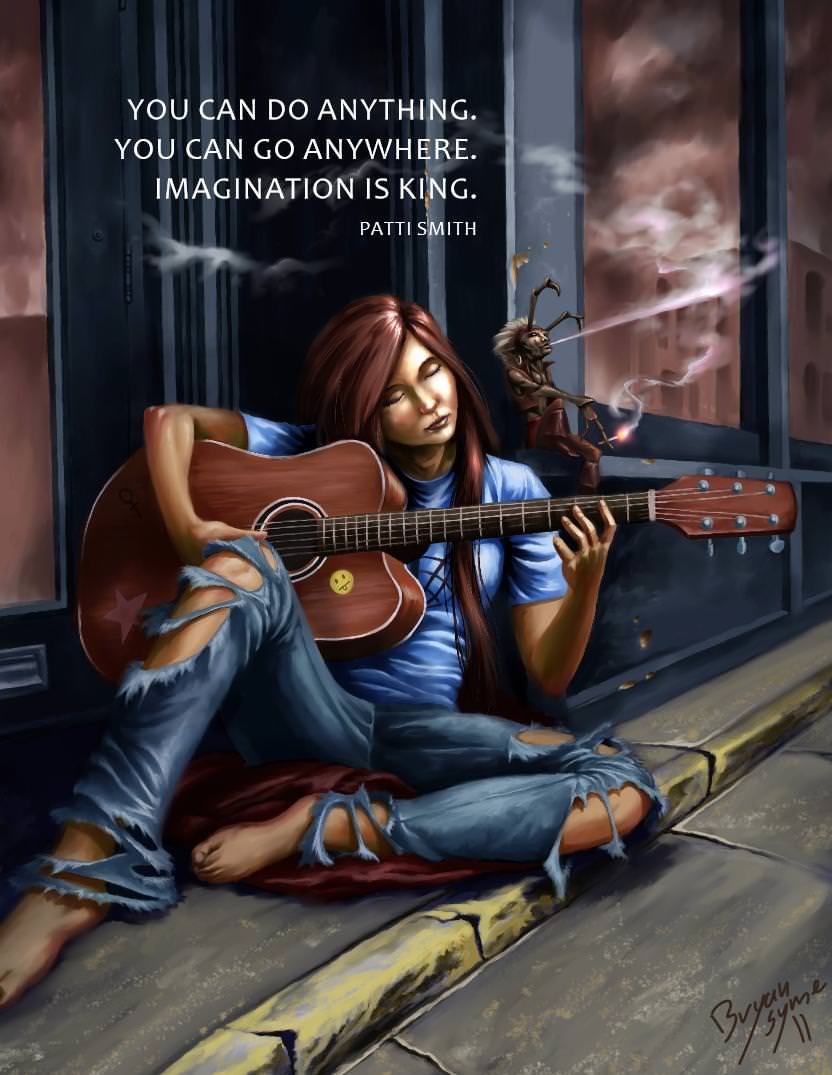
The main character used for several things in the book, from Brucato's abandoned webcomic Arpeggio, and her companion, a living embodiment of the joke about Keith Richards, roaches, and the apocalypse.
Welp, time to rip this bandaid off.
As alluded to, the actual opening text of this chapter is some of the worst in the book, and the first of several reasons we're gonna be having content warning blocks. However, so as not to poison the entire post before it's even started, it will be included in the next update instead, with text it fits alongside. So, let's see what our intro is, shall we?
quote:
Popular music stars are the gods of today’s mythology. Artists like Tupac Shakur, Johnny Cash or the Rolling Stones are our deities. Songs like “Stairway to Heaven” or “Don’t Stop Believin’” have become our gospels. Styles like Punk, Gangsta, Goth and Hippie present cultural touchstones far beyond the music scenes where they began. Almost everyone under the age of 50 (and beyond that age as well) has wanted, deep down, to bathe in the blazing lights of stardom, belting out That Song that makes the young girls cry. For better and worse, our last 60 years echo with rock, hip-hop, country and the blues. This music shapes our look, language, attitudes, and even history. What better word could there by for such effects than magic?
So yeah – welcome to the game.
Gee, I wonder why he picked the age of 50. You may note the particularly myopic takes of genre there as well - and if you're tempted to give credit for Tupac getting an early mention, don't, because this the only time he's ever even alluded to. We'll address how he refers to Biggie when we get there. Oh, and no Wu-Tang, no Grandmaster Flash, NWA only gets a suggestion that you watch their biopic and a comment about Ice Cube making kid's movies, no Jay-Z, no Kanye...
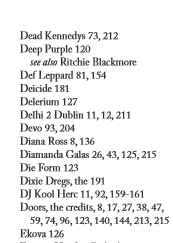
and motherfucker forgot about Dre.
Look I'm getting this out of the way early, I seemingly know more than Brucato does about the history of hip-hop and I am extraordinarily white.
Anyway, moving on. I'm going to be posting direct excerpts of the text quite often for a little while because, as you probably have picked up by now, it's impossible to fully critique Brucato's writing without you understanding how he writes it.
quote:
A Farewell to Kings
“Music,” said the philosopher Boethius, “is so naturally united with us that we cannot be free from it even if we so desired.” Rooted in the sounds of nature and the echoes of the spirit, music remains one of the most significant human arts. Music stirs emotions, rouses ghosts, seduces elves, and tempts gods, men and devils to dance. Inspiring “peak experiences,” it can bring us ex histanai: “out of place.” Music has been said to move stones, shatter walls and foment revolutions. Our modern world is filled with music... and yet, amidst all that sound, the deeper significance of this art is often lost.
It’s easy to take music for granted these days. TVs, iPods and passing cars blast music into every corner of our lives. Still, we share a problematic relationship with it, too. It’s so pervasive, so commercial, so very often junk that music become literally meaning-less (sic). We can rip symphonies from CDs, buy ‘em for a buck or two, link remixes to our Facebook pages, or simply download the pleasures of kings for free off the internet. What was, until recently, a unique transformative experience has become “data” in our world – endlessly replicable and infinitely collectable.
Speaking personally, I have more music on my iPod right now than most people would hear in their lifetimes a century ago... and yet, I constantly crave more of it. We’ve probably got that in common, you and me – and we’re in good company there. Like anyone who gets too much too easily, though, we lose track of how precious music is. To us, its magic has become mundane. We use music for damn near everything. What, then, in our world does it MEAN?
When transcendence is cheap, what value does transcendence have? How many of us are willing to even askthat question, much less willing to find out?
Characters and stories from Powerchords reveal the deeper levels of music – not the soundtrack of our daily buzz, but that transformative and all-too-fleeting burst of Other. The paradox, though, is that music is so meaning-full (sic) to such people and their adventures that it assumes day-to-day roles, yet never becomes routine. A professional pianist practices scales and exercises for hours each day precisely because music matters so much to her. The glamour of a musical life is part of Powerchords’ appeal, as well; you wouldn’t be reading these words right now if you didn’t want to vicariously rock out.
So whatever role you choose in a Powerchords saga, ask yourself where, how, and why the music affects your character’s life. Whether that character is a musician or not, music’s influence will play a major role in the role you choose to play.
I have a lot to say about this stretch, so I'm going to try to pack it all together succinctly.
The first is that reading this vividly reminded me of the extreme danger in writing conversationally (he says, writing a semi-conversational review.) While it's not something people often think of, there's a conception of personal space in writing - a text attempting to create an intimate connection with you too fast, or inappropriately, will have you mentally recoil from it in aversion. It's fucking hard to establish a rapport with a general audience via text, because you can only make very broad assumptions of who's actually reading it. Here, it's fairly clear to me who Brucato has put into the role of the audience: himself. This monologue is not attempting to convince the reader or explain a point of view, but assumes the reader is already on board 100%. This is generally ill-advised when writing for a broad audience for pretty predictable reasons, but as the output of a small passion project Kickstarter, it's a pretty unsurprising angle of narrative voice, if still one I fundamentally disagree with. It is, in my opinion, wise to hedge your bets and assume little about your reader(s), so you can avoid a whole lot of pitfalls based on assumptions.
The second is that I fucking hate this sort of angle. Humanity, as the thread has noted, has made music as long as we've been able to stomp, yell, clap, and smack things against each other that make cool noises. This reads like the hot take of a disaffected teenager, not someone nearly twice my age. There are so many different takes you can have on the mass creation and archival of data and what that does to humanity - hell, I have a Master's degree that supported thesis papers like that - but just grunting that "more bad" makes this read like an image board poster mad that the normies are ruining their hobby. Mass exposure to stimulus does desensitize you to it but it also creates a wider network of appreciation for what you do and do not like, when approached constructively. On top of that it's riding sidecar to a weird sort of gatekeeper undertone relating to enlightenment and beauty. Does something beautiful intrinsically become ugly when more people can see it? Does the world's most heart-rending song become somehow less meaningful if someone else hears it with you? If a thousand other people do?
That's the other problem with conversational styles of writing. I'm writing this on a forum! People can actually debate me on my statements! Publishing a book cuts off the return channel of response and critique, making a one-sided debate ring a whole lot more hollow if you say "now wait a second" to it, because it was probably written assuming it would never be challenged...especially this time, considering the author.
Moving on again, we have a sidebar that I want to copy in its totality, but instead I'll sum up for sake of space. Brucato posits that music can be charted via four traits, and that most bands hit only one, but some hit two, or even three or all four. Yes, he basically just came up with DND Alignments for music, but mercifully it gets far less focus than you'd think it might from it being the first major sidebar in the book. The traits are Guts, Head, Heart, and, uh, Groin.
Head is, to cut the verbiage, music that makes you think, maaaan. Example artists are Frank Zappa, King Crimson, Kate Bush, and Miles David.
Heart artists go for sentimentality, passion, and emotion, and is noted as valid "if sometimes superficial" art, that tends to make "a lot of money." Artists who "perhaps know this territory all too well" are Journey, Kenny Rogers, Celine Dion, and Diana Ross.
Guts music appeals to intensity over thinking, grabbing you by the insides and squeezing until it hurts. Pain, anger, joy, rocking out, head-banging, mosh pits, partying hard, that sort of thing. Cited artists are the Sex Pistols, Janis Joplin, Mötley Crüe, and Public Enemy.
Groin artists, quote, "make you wanna fuck." They ooze lust, whether their lyrics are clean or not, and can make even the most innocent lyrics seem dirty. Artists noted to make Satyros Phil Brucato want to fuck are Luther Vandross, The Rolling Stones, AC/DC(!?), and Madonna. Let it be known that the fact that this category, cursed as it may be, was not just "Barry White" four times disqualifies it entirely in my eyes.
This last bit though...I'd be doing you all a disservice by not posting it in a screenshot so you believe me when I say I didn't edit a fucking word of this.
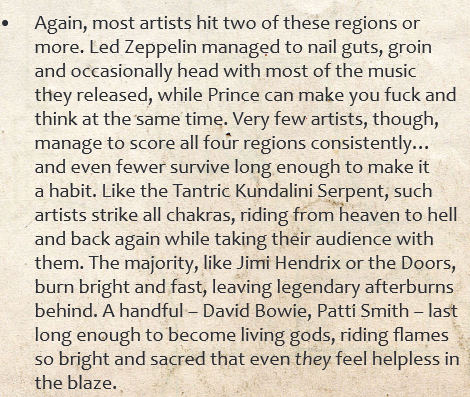
mods change the thread name to Tantric Kundalini Serpent Appreciation Station tyia
We can breeze by the next bit because it's about discussing what style of game you want to run with your players. Is it going to be a big dumb fantasy-laden comedy like Pick of Destiny, or is it going to be a Behind the Music episode about a rise and fall that has a little bit of magic, etc etc. There's also a suggestion I actually kinda find cute, that you can play Rock Band with your group as part of the creative process or during the game itself as a more direct way of incorporating the fantasy of being a band.
From here, we get to the good shit: Brucato's List Of Magical Genres. It's been alluded to earlier in the thread that his blind spot here is going to bowl a lot of people over, so you've got one last chance to guess to yourself what's not going to be represented. Got it in mind? Good, let's go.
Brucato notes that the list is non-exhaustive, and is specifically about popular genres "in roughly historical order," because the game itself by necessity focuses on more popular genres and forms. Note that anything said here about a genre is his (paraphrased) words, not mine.
First up is European Classical, orchestral and choir music that goes back hundreds (and perhaps thousands, depending on your leniency) of years, has long roots in sacred/liturgical music, and focuses heavily on complex layers of melody. European Classical is seen as the basis of formal musicology in most of the Western world (and thus something to rebel against if you're that sort of type,) but some modern composers have begun to popularize indigenous styles from India and China, or integrate parts of them into novel forms of composition. Next is Folk music, here defined as "music by 'the common people'." Folk, unlike Classical music, tends to be simple, with vocal, lyrical, and instrumental components to add elaboration. Folk is focused on the common man's view of social and worldly issues, and is often a blend of the musical styles of all present cultures in the region, united by being on the bottom. Next is Blues, noted as "perhaps the most influential style of music aside from European Classical." A type of Folk music from the age of American slavery, it is defined here as combining "African rhythms, European folk music, intense passions, and a "call and response" technique." The impact of the Blues on American music history cannot be overstated, and especially impacted jazz, rock, country, hip-hop, and soul music.
Next is Jazz, which "combines the earthy passion of blues with the instrumental virtuosity of classical and the improvisational framework of folk." From origins in New Orleans, Jazz spread across America and eventually became an international style after World War II. "Characterized by propulsive rhythms and improvisational prowess, jazz becomes the first "breakthrough" form of popular music, embraced by audiences of all ethnicities and forming the first commercially viable form of the recording era." (This rather glosses over the considerable PR-with-racists problem Jazz had to brace against for, oh, I don't know, a century or so.) Jazz's decline in popularity after the 70s is chalked up to "increasing sophistication and elitism", but is said to still be one of the most respected genres, citing the old joke that when composers and rock stars get bored, they try to play jazz.
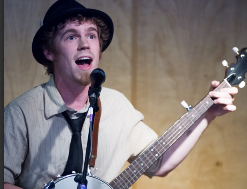
Next, Country, and boy was I surprised when this wasn't a whole segment about "it sucks and it's for idiots." The "white man's blues" came from rural Appalachia, the American expansion westward, and the wide, lonely spaces tied up in both. Combining blues, British folk, and bits of indigenous music, Country began to split into several subgenres almost instantly. "Old-timey/western" music became "Grand Old Opry", and from there a divide was formed between commercial country, "rootsy bluegrass", and outlaw country, which has created countless dozens of splinters, cross-overs, and sub-genres. These styles are all united by a general sense of push and pull between heaven, hell, and the human heart, as well as simplicity of form paired with excellence in performance. Even when it's sung by Canadian, Australian, or Russian artists, Country is inescapably American.

Next, Pop, defined primarily about being what sells rather than what's artistic. Designed by committee and smoothed out from the more challenging aspects of other genres, Pop is often buried in (often deserved) criticism for its unrepentant focus on broad appeal, but there is art to be found in the skills of artists like Michael Jackson and Lady Gaga, who rise "from the one-hit wonder hordes" to demonstrate a grasp of music, psychological technique, and style that would otherwise go underrated. Both, alongside Berry Gordy of Motown, are noted as artists who can fuse "sincere passion and an authentic voice" onto pop and thus create some of the finest music ever made while still being commercial gold.
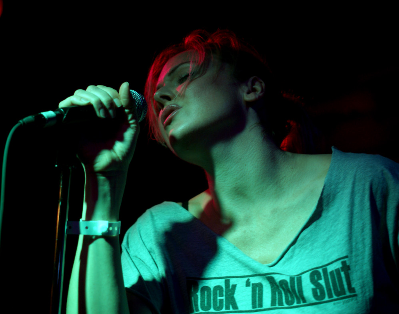
After that we get Rock, introduced as "perhaps the most diverse style of music on Earth," and "more an attitude than a form." Fusing blues, jazz, folk, country, the four/four beat of "Native American music", and the doo-wop vocal styles of 50s pop, rock can be tracked as a musical force as early as the mid 50s. Usually, but not always, driven by a combination of guitars, drums, and vocals, Rock pairs "passionate delivery and instrumental prowess with swaggering, carnal rebellion." Despite "the cranky pronouncements of each week's aspiring Lester Bangs, rock can be polished but it cannot be faked." The text posits that the ultimate core of Rock is tension - musical, sexual, emotional, and political. It is given accolades as the "epic musical momentum" that "literally reshap[es] social geography on a global scale", but its star fades by the mid 90s, "neutered by age and respectability," with hip-hop and reggae displacing its countercultural legacy.
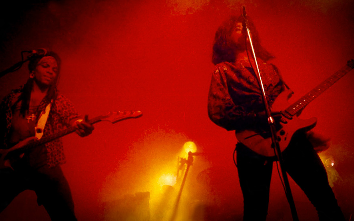
Next, Soul, which the text includes R&B with, defined as a fusion of the emotional intensity of the Blues with the virtuosity of Jazz, the attitude of Rock, and the glitz of Pop. With African syncopated rhythms that "hit a powerful emotional core," melodic flourishes, and an ability to speak to the heart (smooth soul) or the groin (funk), Soul paralleled the rise of Rock, but the text doesn't note any fall paired with it. After that is Reggae, a mixture of African, French, and Native American indigenous musical styles that speak for the underdog. It's often considered a mystical, spiritual, and political force unto itself by its artists, wearing down resistance and opening the way to a new, better tomorrow. While it has never reached truly mainstream cultural or commercial success, dozens of countercultural and minority movements around the world have readily adopted its lilting style, characterized by slow, loping, interlaced beats with off-rhythm accompaniments.

After that is Techno/Industrial, which came into its own after the 70s introduced commercially affordable synthesizers. Noted as a mix of the often harsh nature of machine-generated music, "hypnotic mindscapes of psychotropic drugs," and the "dehumanizing alienation of industrial culture," early industrial and techno's musical commentary on sound, culture, society, and machines wasn't alone- there was also the organic performances and electronic backing of disco. In the 80s, New Wave emerged as synthesizers became even more versatile and affordable, and shortly after that, it splintered into dozens of subcultures. The genre tends to share hypnotic soundscapes, dramatic cuts within the music, and repurposed sounds and elements of other songs mixed into new ones.

Next, Hip-Hop. It's cited as coming from New York in the mid-70s as a fusion of dance, political poetry, visual art, and music cut from existing funk, soul, rock, and reggae records, pioneered by Gil Scott-Heron and DJ Kool Herc. Records were scratched to loop instrumental sections, allowing the MC to deconstruct the music and add their own wordcraft. Hip-hop is stated to be second only to rock in diversity of style, from simple beats with bare-bones rap to grand, complex tapestries of original and sampled work alongside blisteringly complex and intricate rhyming. It, like rock, also has an accompanying culture interwoven with the music, which has expanded from primarily urban African-American communities to become an international presence. It, however, favors vocal dexterity and lyrical complexity over instrumental prowess. "Though associated with gangsta culture," the text says, "this culture is essentially progressive, defiant, and determined to make things better than they were before." Don't expect that to ever brought up again.
Second to last (thank God) is New Age, immediately refuting its dismissal as "elevator music" to state that it's a mix of classical, folk, world (not mentioned yet, and not mentioned correctly), techno, and hip-hop. Originating as a tool for relaxation meditation in the mid-70s, New Age downplays heavy, propulsive beats in favor of melodic harmonies with spiritual overtones. Mingling Classical, Celtic, Native American, Indian, and Arabic musical traditions - the book says "often in ways that could be considered cultural appropriation" here like Brucato didn't immediately burst into flames writing that - New Age noteworthy for a "much wider ethnic diversity than many other popular music styles." Artists like Karsh Kale, Vangelis, and Azam Ali have driven the fusion of New Age with techno and world-beat (here mentioned correctly!) further than early artists dared to go.
The mention of Vangelis here is particularly hilarious because he's noted on Wikipedia itself as saying that New Age "gave the opportunity for untalented people to make very boring music."
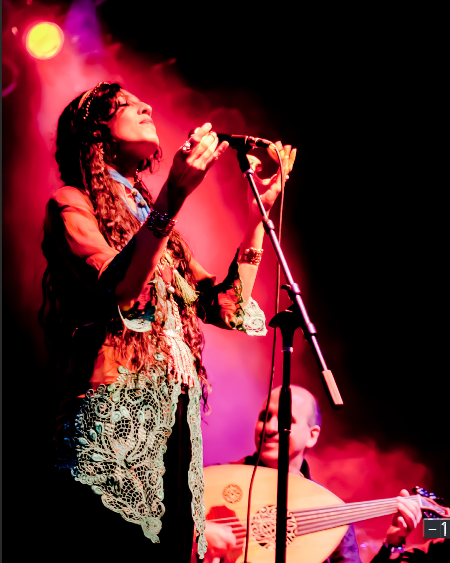
Lastly and finally, we have World-Beat. The very first sentence says that the term is a catch-all for, in-quotes, "all music that's not blues or white-boy stuff." World music is a style that taps into traditions neglected by Anglo/Franco/Germanic cultural imperialism. Traditional music China, India, Japan, the shock-quotes "ethnic music" of Africa, Asia, and South America, historically marginalized European cultures like the Scots, Irish, Romani, Slavs, and "the general Native American cultures, too" all count. Technically, the text notes, this makes world music millennia old, while world-beat mixes them with popular music of the modern day. The Hawaiian music craze in the 40s and 50s, Latin American and Indian influences in the 60s, and Arabian techno and Asian trance in the modern day are all cited as world-beat. Another form is taking several diverse styles along with several popular ones and mixing them all into something new. Delhi 2 Dublin, Shakira, Miyavi, and Kan'Nal, quote, "point to the next revolution in music - one in which borders of geography and ethnicity disappear in a blaze of technological connection and universal art."
I don't know about you guys, but to me, that that sounds uncannily like a forgotten Metal Gear villain's manifesto. Y'know, one of the like fifteen people who heard about The Boss's last wish and then presumably wandered off to huff a shitload of paint.
I'll let the last bit of text speak for itself here:
quote:
Regardless of its form or label, music is personal history – a reflection of the artists who create it and the cultures that create them. That truth is worth remembering whether you’re a fan, an artist, a critic or whatever. Music is history and culture, flowing from the times and places and people who create it. And although you can freeze it now in a recorded moment of time, there can be no “pure form” of music because music is not some Platonic ideal.
Like the sound waves that echo outward from a physical action and then take on a shape of their own, music shapes itself to the “contours” of its surroundings. Even in an age of recorded sound, the physical, instrumental and emotional elements of music remain ephemeral and oddly personal. Two guitarists can play the same sequence of notes on the same guitar, but the way they play them will always sound slightly different, and the people who hear those notes will have slightly different emotional reactions to both the musicians and their music. In a literal as well as a poetic sense, music is us – grouped by rough generalities but ultimately unique.
Kinda goes against what you just said about world-beat but whatever.
And that's it!
Did you notice what's missing?
Yeah, in the game that blatantly stole Metallica's logo style, that constantly talks about Motley Crue, Tenacious D, and KISS, and gives props later to Black Sabbath, Ozzy, and the Metallica vs Megadeth feud, there's not so much as a passing acknowledgement that any form of metal exists except as a hegemonous part of rock and roll. Because I, for one, consider Iron Butterfly to be more or less the same as Gorgoroth.
Ah, well. When we get to the not-Paradigms later that'll probably account for the difference.
You read that right. They're baaaaaaaack

Next time: Character creation, or: why you maybe shouldn't have heavily implied incest on page 7 if you want the reviewer to stay neutral when you get really weird
Track III: Doch Nur Ein Tier
Original SA post

Gonna reiterate this warning for this post.
Track III: Doch Nur Ein Tier
quote:
Depending on the game you’re running and the setting you prefer, music might be a passionate hobby, a beloved past, an unfulfilled longing, or the center of your character’s world. She might be a struggling street busker, a gifted guitar craftsman, or a talent agent with an ear for The Next Big Thing. He could be the assassin who whistles a “special” tune as his target comes into view, or the superhero whose secret identity manages a record shop. That tone-deaf bartender might be an aspiring Lestat; the mountain of muscle hefting gear could be an ogre in disguise. Most folks love music; in Powerchords, however, that love becomes an active force in their lives.
Like a song, a good roleplaying character demands planning, riffing, structure and creativity. Sure, you can just throw a bunch of stats on a piece of paper, give ‘em a name, toss out a description and call it a character. You can also pick up a guitar, strum the strings, mumble some lyrics and call it a song. Chances are, though, the results from either option will suck. So approach your character, then, as you’d approach a song. Make an effort. Make it memorable. Make it cool.
So now we reach the character creation segment of Powerchords, and this is where one of the core conceits of the book starts to get strange. See, as mentioned, it's designed to be run on top of any other system (though Vampire and Shadowrun being the two examples given later in the book paints a certain picture of 'any other system'), but it also comes packaged with a trimmed down version of a system designed for one of Brucato's other independent games, Deliria. It's referred to as the Compact system, and is not really fully explained until a sidebar a third of the way into the book. The full system isnt included (since, again, this is meant to be stapled Frankenstein style on oWoD - and let's be frank, it's always gonna be oWoD), but enough is to describe some of the basic mechanics. You determine how difficult the task you are doing is with a Challenge Level, how you're trying to do it by combining traits into a pool, whether or not luck goes with you via the draw (explained at the front of the book as being synonymous with rolling dice, as Deliria's resolution mechanic relies on a deck of playing cards), and narrating the results based on what you get.
If you'll note, that's indeed just how Shadowrun and oWoD do things. I can't help but think he's spinning an intensely derivative system here to be compatible rather than a knockoff. Theres the occasional mechanic as well where shifting from a specifically stacked deck of cards to a dice roll of anything from a d4 to a d100 rather dramatically changes the probability involved, but hey, who's counting, right?
Additionally, I have to reiterate, the game doesn't give you enough information on how Deleria's resolution mechanics work to let you play the game at all without stapling it to something else. You want to run it with the example mechanics and terms given in the book itself? Go buy Deliria. I know it's an "open source sourcebook" but Jesus, at least tell people how the Compact system works. I had to look up a review to find the answer: you take your ability score, and if it isn't enough to immediately succeed, draw a card from a deck that has both jokers and the King of Clubs and King of Diamonds removed. If the card's red, it's positive, if the card's black, it's negative. Either add or subtract the number on the card to your result if it's got one. If it's a Jack, it counts as zero; if it's a Queen, it's an instant success or failure; if it's one of the Kings, it's an instant Triumph or Disaster, which are synonymous with exceptional success and botch/dramatic failure.
Seriously, he didn't put the resolution mechanic in. If you expect anything but broad advice and system-agnostic suggestions you'll have to crowbar into place, you're about to be real disappointed.
Anyway, we get to the step by step process for making a character. Step one is, and I quote, "Literally write a short story about your character."
Yeah. I'm serious. Not "come up with an idea in the first place," no, go write 5,000 words about them! You've got to be artistic about this! Before picking any traits or anything, you're explicitly expected to have a character idea, have a conflict in mind for them to encounter, know how they would approach and deal with that conflict, and then present a short story about that to your group. I guarantee you that if any of my groups had told me that was a necessary part of the process of making a character I'd have bounced on the spot. Not only is this ridiculous to demand (prose is not the same skill as roleplaying you jackwagon), some of my best characters have come entirely from stupid ideas with little backing beyond a name, a face, and a vague concept. One of the best ways to flesh out a character is to have a strong core, throw them into a roleplaying environment, and have them get characterization by reacting to the world around them. Additionally, damn near every Chronicles of Darkness book I have is completely down with your character concept being "yo, this power here kicks ass, I want this to be my signature move." Here, you're told not to touch them. What the hell happens if I build a character concept around jamming so hard that I make people compulsively do the Thriller dance, then I go over to the powers and whoops I can't do that, or it's prohibitively expensive, or whatever?
From there, Step 2 is doing the things you should have done first: answering a bunch of questions about the character that spark ideas. They're structured as the "Powerchords Top Ten," and are as follows:
Motif: What's your archetype? Who are you, what do you do, what are you like? Are you a musician yourself, or someone related to the biz that doesn't play? There are a lot of examples given, with larger writeups after this chapter, but you're encouraged to make up your own or mix and match elements as you like, and despite all the wordcount none of them have any suggested mechanical impact or build advice beyond generalizations.
Chord: How'd you get started? What made music so important to you?
quote:
"For most folks, it starts with a defining moment where a kid (it’s almost always a kid) realizes Holy crap – I wanna do THAT! A chord is struck in that kid’s soul, and the echo reverberates throughout his or her life."
Was it a specific moment, like Wendy O Williams blowing up a car on the Tomorrow show, or Storm Large playing at Rock Star Supernova?
Ah, I should mention here Storm Large is one of the small circle of characters and bands as a part of the default Powerchords setting that's used as an example from time to time. They have this funny habit of showing up in the same breath as bands that Brucato adores. Can't figure out why.
At least "I had a religious experience in Sunday choir" is another example. I suppose.
Backstory: Were you raised by musicians, magicians, or fundies that hated music like hit movie Tenacious D: Pick of Destiny? How'd you get trained? How did growing up affect you? What was your family like, your first boyfriend, your neighborhood?
Image: Musical genres and styles are often intertwined with culture, attitude, and fashion. What's your look? What's your sound? What do people think of you when they meet you? How do you come across to people when they get to know you more? Are you a poseur, or were you born to be a rock star? What kinda clothes do you wear?
Ambitions: What do you want? Do you want to "make Eric Clapton cry, out-mope Morrisey, or freeze dry both Ice-T and Ice Cube? white boy spotted" What's your deepest passion, your driving obsession, what's "stiffening your steel?" What is greatness to you, and how are you gonna get it?
Obstacles: What's in your way? How does the world, or other people, make things difficult for you? How do you make things difficult for yourself? Did you practice guitar scales while your friends O.D.ed on World of Warcraft? Lose your job or get bad grades over your passion? Wear corpse paint to Grandma's funeral?
quote:
On a similar note (so to speak), what musical quirks do you display? Do you drum your fingers on every flat surface, or scribble new raps on napkins at your fast-food gig? Are you that guy who can list the instruments Geddy Lee played on Hemispheres? (Sadly, this author is...)
Oh, Brucato, you are That Guy in more ways than I think you like to admit to yourself.
Territory: Like most other wild beasts, Brucato writes with palpable self-satisfied smirk at turn of phrase, musicians tend to have territories. Is yours your favorite bar on Friday nights? The corner club where you play gigs? The place right next to your fireplace, or on the corner, where the acoustics are just right? Do you jealously guard your spaces? Is someone trying to fight you over them?
Company: So, are you in a band? If not, who do you jam with, and who has your back? Fans, groupies, your long-suffering parents or friends? Do the cops roll their eyes and sigh when they get noise complaints from your neighbors at 1 in the morning, again? Is your lover paying your rent for you?
Goodies: What's your stuff? A fancy software suite, a battered thrift store guitar, a family heirloom, a $900 microphone? Most musicians, Brucato says, have one or two pieces of significant gear that is practically a part of them, like Gene Simmons' face paint (natch), Michael Jackson's glove, Van Halen's Gibson, Flava Flav's clock, Brian May's homemade guitar, "the flute your late Mama gave you in fourth grade", and the crosses that Ozzy Osbourne started wearing "when things started to get weird for Black Sabbath." What's your personal item, the thing that speaks volumes about you?
Magic: Finally, we get to the goddamn magic part of the magic music game. I'm just going to post this bit verbatim.
quote:
Intentionally or not, a Powerchords character weaves magic with his music. This could take the form of elaborate rituals (like the Black Mass on Coven’s album Witchcraft Destroys Minds and Reaps Souls); shamanic invocations (Jim Morrison’s lyrics); mystic undercurrents (Led Zeppelin’s fourth album); occult posturing (Black Sabbath’s entire career); metaphysical subversion (Killing Joke’s entire career); psychotropic ragas (Hossein Alizadeh); hypnotic soundscapes (Soriah); instrumental prayers (Moby); lyrical enchantments (Loreena McKennitt); conspiratorial revelations (Canibus); psychic noise terror (Throbbing Gristle); spiritual purgation (Johnny Cash); heart-bursting praise (gospel music) or oblivion (black metal)... the possibilities of musical magic are almost literally endless. How, then, does your character employ them? As a priest? A seer? An enchanter? A destroyer?
Even if your character isn’t trying to create magical effects, reality may shift when he performs. The fiddler who conjures up his muse, the deejay who evokes an orgy, the desperate bluesman at the crossroads... they might not mean to work magic, might not even believe that such things exist, but still their art manifests in strange, blissful and often terrifying ways. How and where does magic manifest for you? Do you realize what you’re doing, or recognize that such things exist? What are your intentions when you work your arts? Can you put down the things you call up... and what happens if you can’t?
I leave it as an exercise to the reader to parse what the hell is going on in that list of examples.
After that, it's suggested that your character, once a song, now becomes an instrument in the band that is your group, yadda yadda, work together.
And now, we reach the part I've been dreading: the intro text I skipped.
 The following spoilered section is a barely veiled description via music-as-metaphor of father-daughter incest that set off a flashback in a child sex abuse survivor I ran it past to make sure it wasn't just me who thought it was skeevy. Later context, and phrasing, indicate this is meant to be viewed as a wistful happy memory than something horrifying. Sections after the spoilered blocks will contain repeated mention of rape, endangerment, and examples of Brucato's personal interests that align uncomfortably over the text.
The following spoilered section is a barely veiled description via music-as-metaphor of father-daughter incest that set off a flashback in a child sex abuse survivor I ran it past to make sure it wasn't just me who thought it was skeevy. Later context, and phrasing, indicate this is meant to be viewed as a wistful happy memory than something horrifying. Sections after the spoilered blocks will contain repeated mention of rape, endangerment, and examples of Brucato's personal interests that align uncomfortably over the text.
quote:
I knew I had a gift for this the day I climbed up in Dad’s lap and started banging on the keys. He was playing something and I liked the sound and I was just a little kid so what the hell did Iknow, right? He was kinda annoyed and all like, Come on, Meghan, Daddy’s working and all this but I reached up past him and just...I don’t really know how to describe this but I could see the sounds floating over the keys when I looked at all those black and white strips of stuff and I thought something like Hey I can do this too, and so I did.
And it didn’t sound like noise. It sounded good, y’know, and Dad, he just looked down at me and he’s like, Huh, and then he started stroking keys too and we started playing off each other, and – at least as I remember it, it sounded really good.
For a long time, everything else seemed to stop and fade away. I remember bits of dust suspended in the sunlight in the air over Dad’s piano. I looked up and his face was... I don’t know how to describe it, it looked complicated, like he was surprised and amazed and happy and maybe a little bit scared. We played for a long time and my Mom – this was back before she...she left...she just walked in and stood there and looked at us both and she was really still, and then she turned around and walked back into the kitchen really stiffly and said nothing to either of us for a long time after that.
Dad got me my first guitar, this little kid’s thing but a real guitar, a few days or something later. He used to hold me in his lap and show me where to put my hands. It was harder than the keyboard ‘cause the strings don’t have permanent notes, but I practiced and he seemed happy and for a long time that’s what held us together.
For a long time, yeah, I was like Daddy’s little girl.
I really, really, really, really have tried to give this section the benefit of the doubt. I honest to God have. But there is no way in God's green earth you can write "He used to hold me in his lap and show me where to put my hands" without realizing you are using the exact same language children use when discussing their sexual abuse. This compounds with "stroking the keys", the time stop, the dismissal of youth meaning you don't know what you're doing, the emotions described on the father's face, and the mother - described as abandoning the family for unstated reasons - reacted to what is, textually, a father and daughter playing piano with numb shock and denial.
If instead, say, she walked in on her husband fondling her daughter, the passage, and her leaving him, makes (horrible) sense.
And then she gets a "real guitar", "harder than the keyboard," but she "practiced and he seemed happy" and that's what kept the two of them together. And it's capped off by her reflection that she was "Daddy's little girl," another phrase it should be impossible to write in TYOOLs 2010-2017 without realizing how loaded it makes the segment, especially with all the other shit in it.
After reading this segment, every single mention of kids, youth, or growing up started to set off alarms in my head. And repeatedly, I feel like they're vindicated ones. Go reread that bit about kids going "I want to do that!" in Chords and see how it looks now, especially because Meghan's Chord in the character creation example is cited to be this bit of fiction. What's worse is this is not the last creepy thing we're gonna see relating to fucking people under the age of consent, oh no. One of them is absolutely an in-character statement that it's part of the appeal of being a rock star.
And then you remember shit like this, from Changing Breeds:
or like this, from Mage 20th, written around the same time as Powerchords:
LatwPIAT posted:
There's some intro fiction. I guess I have to actually read this since I'm reviewing here. Sigh.
Mage: the Ascension, 20th Anniversary Edition posted:
I feel like that this morning, and I’m not quite sure why. It’s not the dancing. I’m used to that. Or the hike – that’s my favorite thing in the world, except maybe dancing. It’s not the sex, though gods know it was passionate enough.
Lightning flickers underneath my skin – needles, tongues, fingers, fists, a rush of stars exploding into nova to blot out the thrusting of my father’s cock – but all those eternal Nows are distant to the person in my skin today.
One of the redeeming features of shitty, vague writing is that I can live in an ignorant pseudo-bliss of not knowing whether this lady just had sex with her father or if these are memories of childhood sexual abuse, or some kind of metaphor.
And parts of the intro from Changing Breeds (which I'm not sure if he wrote or not but he sure had editorial power over it):

And these, from a Google books preview of a book he contributed to about sex and paganism, including one fucking horrifying bit I can't decide if Google blessed or cursed me with seeing by breaking:
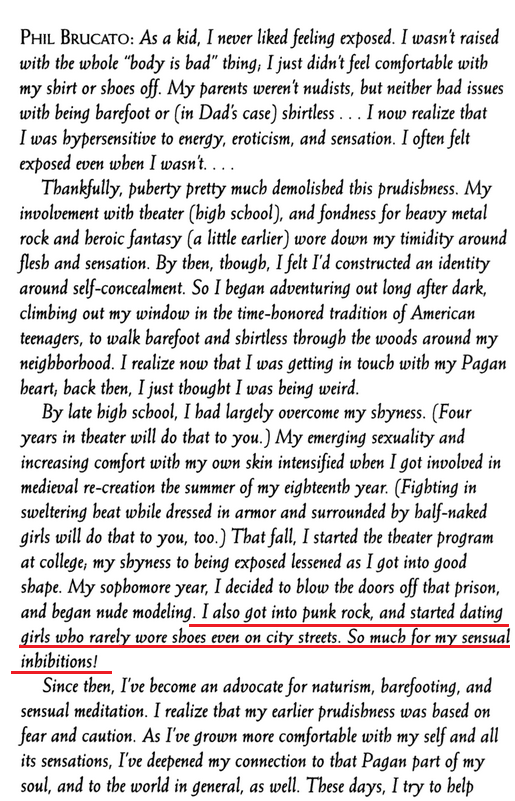
Keep that underlined sentence in mind.

CW: real-ass admission he's been naked around the son of a woman he was dating because it was a nudist home
And the fact that Meghan, the character in this bit, is from a webcomic called Arpeggio Brucato abandoned. Its url currently links here, screenshot included for posterity:
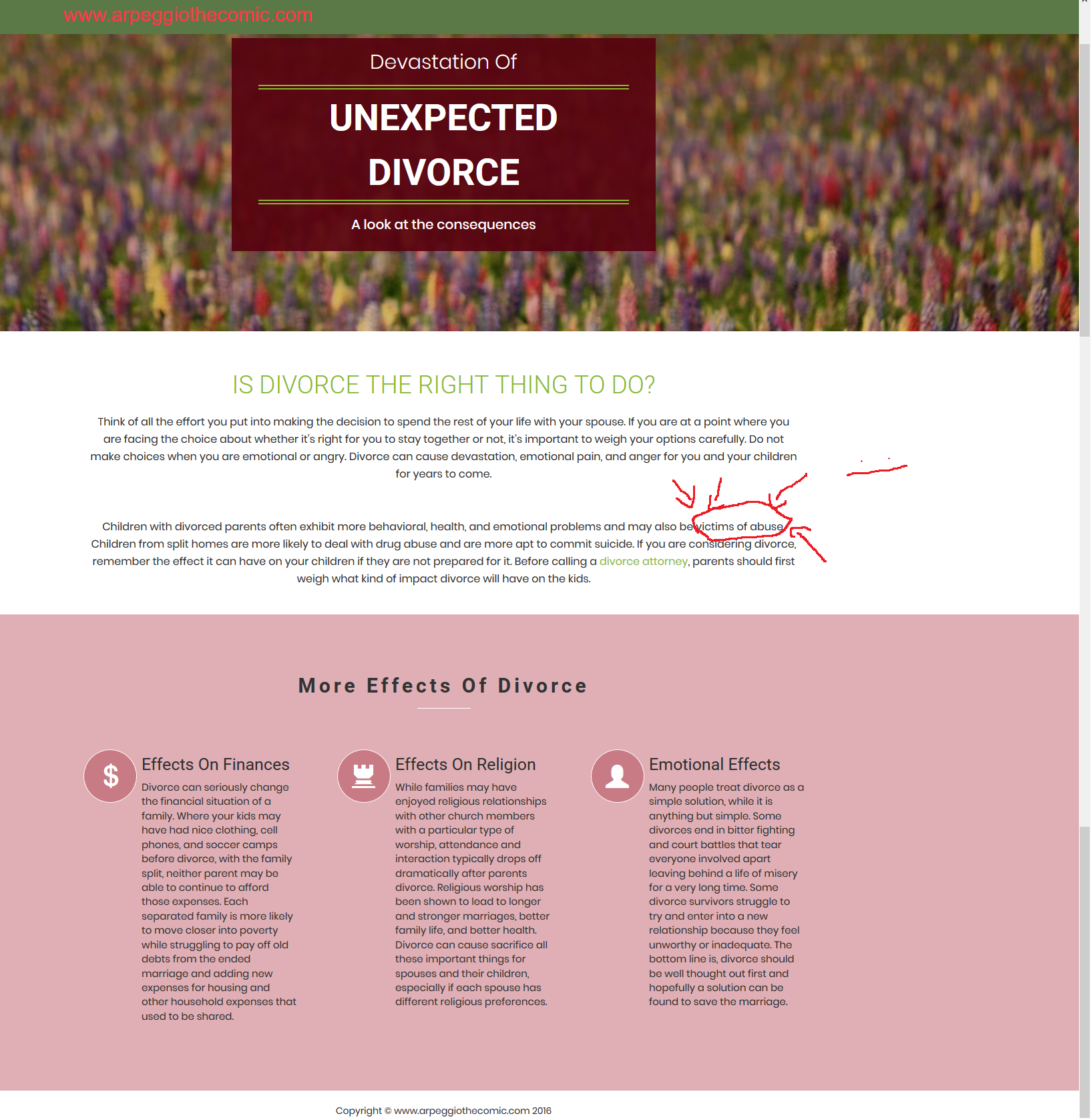
I'm honestly going to go over the lowlights of the character creation example, because fuck the rest at this point.
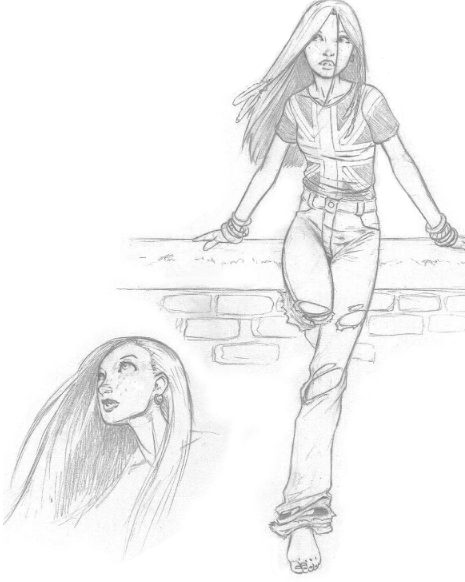
Meghan is sixteen. Her fascination with music began with, that. Her father was a failed musician; her mother was an absent actress who divorced him and abandoned her when she was eight(, making her less than eight years old in that story.) Her father had to quit his up and coming band to care for her, but was a pretty mediocre father, who was obsessed with his past glory. She's surrounded by his friends - all failed or struggling musicians, or people he met in that time - and is thus surrounded by men in their late 30s and early 40s that both "nurture and infuriate her" with "neat toys and a genuine affection for the girl" (
 count 1.)
count 1.) "Beneath the music lessons and encouragement they give her though, there's a nasty edge." (
 count 2). "A few of Dad's buddies flirt with Meghan," (SIXTEEN YEAR OLD), "and while none have gone too far with that (yet...)," (FUCK you,
count 2). "A few of Dad's buddies flirt with Meghan," (SIXTEEN YEAR OLD), "and while none have gone too far with that (yet...)," (FUCK you,  count 3) "it's gotten uncomfortable now that she's past the cute-little-kid stage." (Thus insinuating they flirted with her when she was barely pubescent, and that this was more okay!?
count 3) "it's gotten uncomfortable now that she's past the cute-little-kid stage." (Thus insinuating they flirted with her when she was barely pubescent, and that this was more okay!?  count ∞). Worse, some are noticing her talents are greater than theirs, and that there may be something unnatural to them, and they're growing increasingly bitter about this, "and in time, it may grow ugly..."
count ∞). Worse, some are noticing her talents are greater than theirs, and that there may be something unnatural to them, and they're growing increasingly bitter about this, "and in time, it may grow ugly..."Her guitar is named after Anne DiFranco and she likes punk music done by female singers and for fucks sakes we just had like three threats of impending rape of a teenager dropped like it's a normal way of raising the stakes I can't keep neutral about this y'all
She's barefoot all the time because

And that Meghan, 16 year old threatened by gang rape that dreams of mysterious satyrs, looks like this?
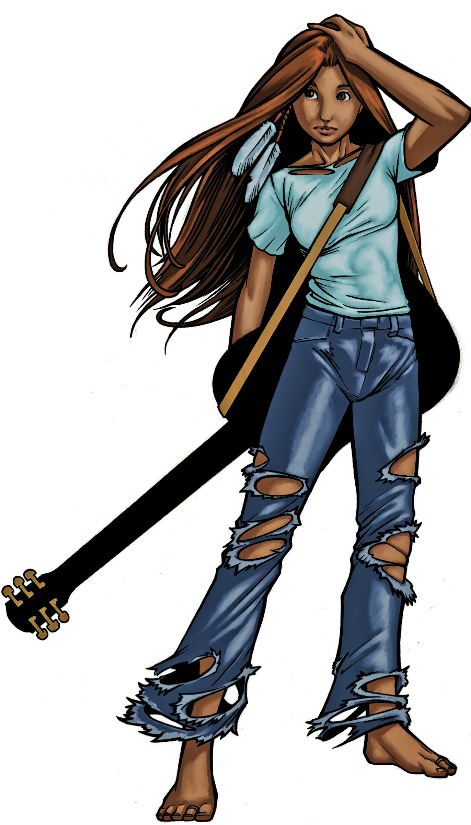
Context is important. Context is what makes it really hard to think this is just a series of writing crutches and hackneyed tropes, or artistic flourishes.
I cannot believe that I feel that I have to write this out, but one of the things an impartial editor is good for is cleaning up language and content choices that make you come across badly, and you were blind to that because, speaking as a writer myself, writers suck at analyzing our own text for typos, let alone tone and implication. It strikes me that it's been a pattern for over a decade that the less strict editorial oversight there is in the production of something Brucato writes, the more it includes weird sex shit that can be read, shall we say, uncharitably.
I consider it another piece of evidence that Powerchords desperately needed an editor that wasn't the author's romantic partner that was also embroiled in his passion project for seven years. I'd be perfectly willing to believe she's a good editor who was just given a bear of a project - but part of project management for a book like this is minimizing what hits the editor's desk...and making sure you don't assign people to roles their personal biases and relationships are going to mess with.
It just happens the evidence for that lesson was profoundly more unsettling than usual this time.
Next time: Splats without number(s)
